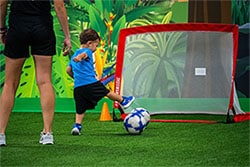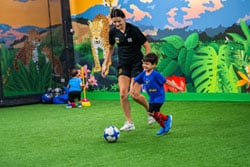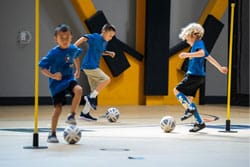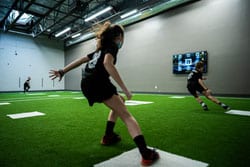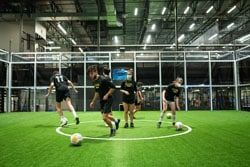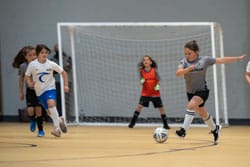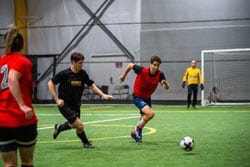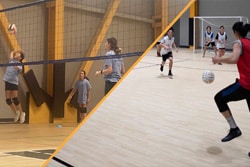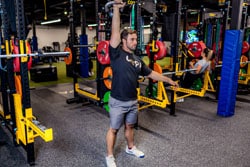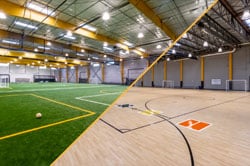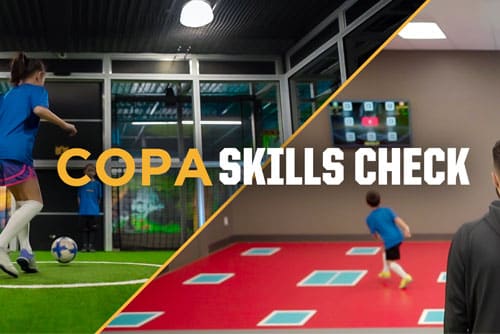Technical Proficiency: Benchmarks of College Players

Players, coaches, and scouts alike all agree in the competitive world of college soccer, technical proficiency is a must-have. Whether it’s precise passing, deft control, or clinical finishing, players need to exhibit high levels of skill to stand out. Coaches look for players who can handle the ball under pressure and make smart decisions quickly. It’s the essence of college soccer across all of the levels. The ability to execute techniques flawlessly can be the difference between getting noticed by recruiters and being overlooked.
Technical proficiency, which encompasses the ability to perform technical skills quickly and accurately, is assessed using our state-of-the-art COPA Cube. This innovative tool measures both the speed and accuracy of a player’s technical actions, providing a comprehensive view of their capabilities. It also challenges an athlete’s awareness and ability to pick up information that will allow them to play quickly. The COPA Cube provides an objective insight into these capabilities compared to the naked eye. This is delivered through our 32-ball assessment protocol which each athlete experiences while taking part in our College ID camps. The assessment measures a player’s speed of play (Cube Speed), the accuracy of their passes (Cube Accuracy %), and the Cube Rating is a score that combines both metrics into one summary score. This score describes a player’s technical proficiency and is used to identify players, set benchmarks across the levels, and pursue refined training programs.

To understand the standards of college soccer players in this technical skill, we reviewed our database of over 500 college soccer players who had performed the test. The 100th percentile was the best score, the 50th percentile was the average score and the 1st percentile was the lowest score we observed.
For male college soccer players, the 50th percentile score for technical speed is 2.04 seconds per action with an accuracy rate of 75%. The 25th percentile scores for these are 2.14 seconds and 65% accurate.
Female players at the 50th percentile achieve a technical speed score of 2.3 seconds per action with an accuracy rate of 68.75%. The 25th percentile scores for these are 2.45 seconds and 61% accurate.
These benchmarks reflect the high standards required to excel at the collegiate level and provide a clear target for aspiring players. Interestingly when we compared prospective college soccer players to college players, we did not find much difference when it comes to accuracy. However, it was evident that college soccer players were able to play faster. They had better habits before receiving the ball, capturing the information they needed for their next action. They excelled versus youth players in executing an effective first touch, again allowing them to play faster. While these margins may only look like 0.2 or 0.3 seconds when compared, it’s that difference that makes them successful on the field at the collegiate level.
For the aspiring college soccer player, navigating the recruiting process can be tricky and flooded with competitors trying to gain the attention of coaches. Understanding how you match up in essential skills like this is crucial for you and the recruiting coach. By comparing a player’s scores in the COPA Cube to active college soccer players, they get an objective comparison in an apples-to-apples comparison instead of seeing these skills evaluated in the athlete’s youth soccer game. This approach creates opportunities for players to market themselves and compare objectively to their aspiring level.
COPA’s College ID camps provide objective data on a detailed series of essential skills through detailed assessments, benchmarked against the standards of active college soccer players. College coaches value this data because it allows them to compare prospective players with their current team members, ensuring a good fit for their program as well as reducing the risk when recruiting a player. This gives them more insight and more confidence that the player will be successful at the college level.
Think you can play as fast and accurately as college soccer players? Join COPA College ID Camps and take the first step towards giving you an advantage in the college soccer recruiting process.

